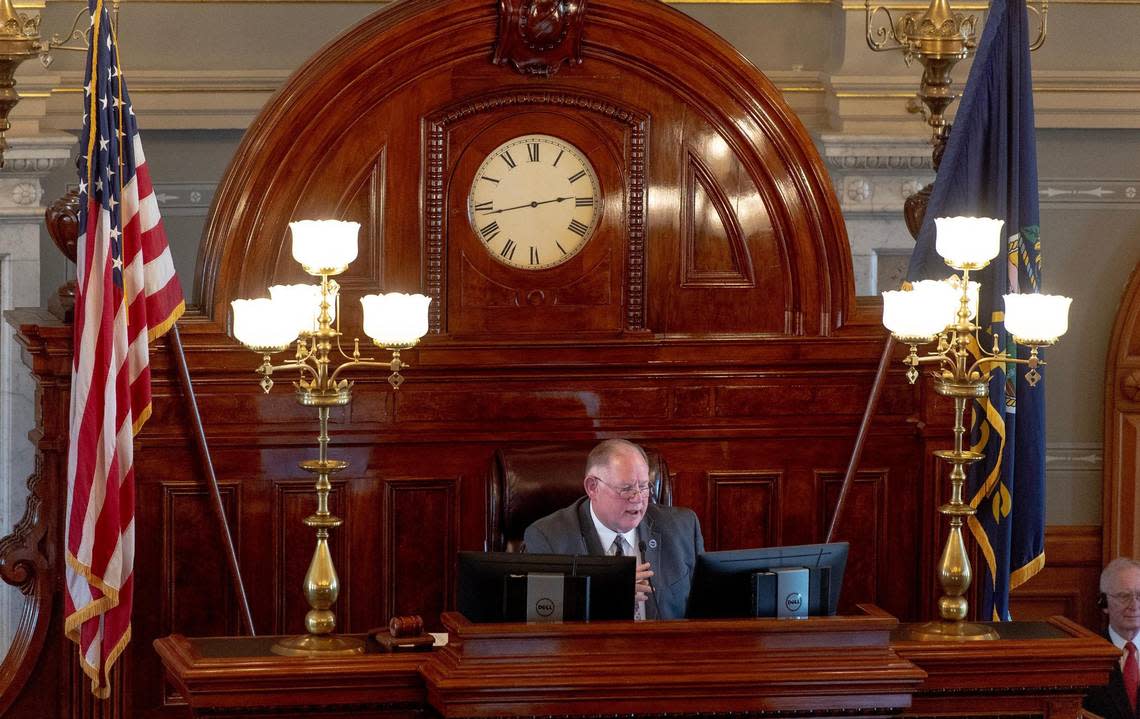Kansas House approves plan for flat income tax, elimination of food sales tax

- Oops!Something went wrong.Please try again later.
The Kansas House approved a tax package Wednesday that combines a flat income tax rate with immediate elimination of food sales tax.
The chamber voted 94 to 30 to approve the bill which now moves to the Senate, where negotiators from both chambers will work out the differences between the House bill and various tax bills the Senate passed last month.
The House plan establishes a flat 5.25% tax rate for all personal income higher than $6,150 and reduces the corporate tax rate to 3%. The bill also reduces taxes on Social Security benefits and eliminates the sales tax on food on July 1.
Republicans framed the plan as a compromise with Democratic Gov. Laura Kelly whose tax plan included reduced taxes on Social Security and elimination of the sales tax on food. Kelly, however, has been staunchly opposed to the flat tax and has labeled such plans as irresponsible.
“We worked together to make a good, and reasonable and sustainable policy and get it out of committee,” Rep. Adam Smith, a Weskan Republican who chairs the House Taxation Committee, said while speaking in favor of the bill.
The plan stands in contrast to tax bills passed by the Senate, which eliminated income taxes on all retirement benefits, set a 4.75% flat tax and made groceries exempt from all sales tax including local. The plan was steeply criticized as too expensive and harmful to local governments that depended upon local sales tax on food.
But proponents say the state’s current surplus funds needed to be returned to Kansans. A separate Senate bill would have created a fund that would repay local governments for lost income but it failed Tuesday.
Enacting a flat tax has been a top priority for House and Senate Republicans who argue it is a way to simplify the state’s tax code and help the state grow in the long term.
Sen. Caryn Tyson, a Parker Republican, said a middle ground for the House and Senate plans could be a 4.95% flat tax.
“Hopefully we’ll get closer to the Senate position,” Tyson said, arguing that amid high inflation Kansans need tax relief.
But opponents argue the move is regressive because it represents a far larger tax break for the wealthiest Kansans than for low income individuals. The flat tax is estimated to cost the state roughly $255 million in revenue annually once it is fully implemented, according to a fiscal note.
The vote to reduce the state food sales tax to zero could be a major win for Kelly who has been advocating for the immediate elimination of the state tax since 2021. Last year, lawmakers voted to implement a slow phase-in of the elimination. Many accused Republicans of delaying implementation so that Kelly could not campaign on the elimination during her 2022 reelection bid.
This year’s House bill gained bipartisan support with 10 Democrats joining majority Republicans in voting to pass the plan Wednesday. House Minority Leader Vic Miller, a Topeka Democrat, called the bill balanced and noted that the rate for the flat tax had been improved from original proposals in a written explanation of vote.
“This bill has a lot of really good things in it and it’s not perfect. It’s a compromise,” said Rep. Tom Sawyer, a Wichita Democrat and ranking minority member on the House Taxation Committee.
It’s unclear whether the Democratic governor will accept the food sales tax elimination as a carrot to sign the flat tax bill. Taking office in 2019 on the heels of the repeal of former Republican Gov. Sam Brownback’s income tax cuts, Kelly has been an outspoken opponent of tax cuts she considers irresponsible.
Kelly’s spokeswoman, Brianna Johnson, said in a statement the governors original tax plan would help Kansans “without robbing the state of its ability to fully fund schools.”
“The most expensive part of this bill — the flat tax — would instead provide less than $2 of savings for middle class families and blow a hole in Kansas’ budget,” Johnson said. “Governor Kelly will continue pursuing an agreement with lawmakers from both sides of the aisle about how to cut taxes responsibly.”
Several Democrats voted against the measure citing the inclusion of a flat income tax. But support for the bill currently would be sufficient to override a veto.
“We want stability for our state without the volatility that a single bracket would cost,” said Rep. Stephanie Clayton, an Overland Park Democrat.
The Senate also approved a bill Wednesday offering property tax exemptions to childcare facilities and health clubs, recreation businesses and restaurants if the government opens a similar operation that competes against them.
The policy is the latest version of a long sought tax cut sought by Rodney Steven II, a Wichita businessman who owns Genesis Health Clubs.
Steven has spent more than a decade lobbying the Legislature using the argument that it is unfair for his businesses to compete with tax-exempt governmental community centers or taxpayer funded YMCA’s.
The current version of the bill only applies to businesses that opened before the governmental entity.

